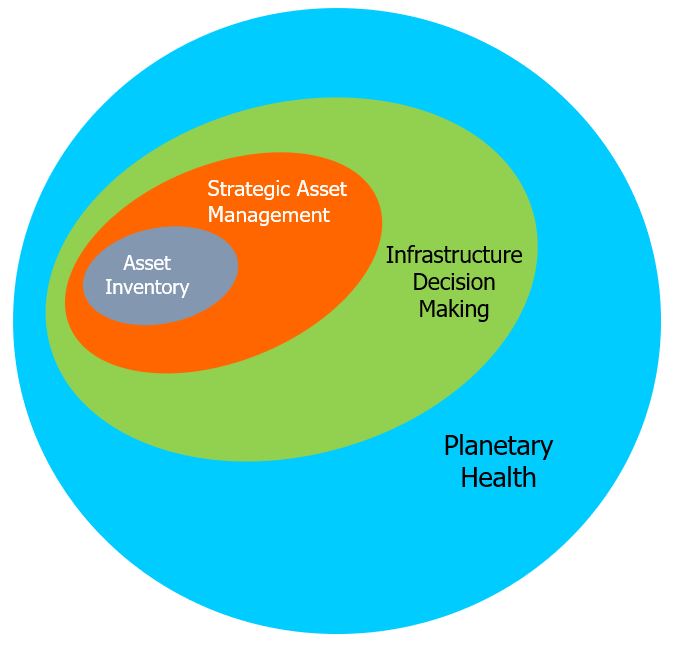
I’ve long been fascinated by the idea that we need ‘bridges’: people who can translate between two domains with different mindsets.
One key gap to bridge is between science and management, as Penny describes https://talkinginfrastructure.com/2022/07/20/science-and-asset-management/ . There are other gaps that affect us in asset decision-making.
In the late 1990s two of us, now very senior IT director Christine Ashton and me, put forward the need for such active translation between IT and business users. IT has always struggled to understand what’s really needed by users, as the users themselves are poor at describing their information and information processing requirements.
Christine and I set up a special interest group in the British Computer Society – an organisation which could do with some translation in the first place – for people who work between IT and business. We had a great time discovering some very good people, who, I am happy to say, generally earned pretty good remuneration for their ability to understand what the users need and turn it into something IT techies could understand (and use). It’s still a rare and precious ability.
And it’s surely still as big a challenge as ever.
Add to that how to bridge between an engineering mindset and business. I train engineers who still radiate – why do I care what the objectives of the organisation are? My job is to do the right thing by the asset, regardless of management.
It’s fascinating in all three cases, because scientists, just like engineers and IT in their different ways, are kinda proud of their ability not to compromise with business and organisational realities.
In particular, the issue of ’embracing’ uncertainty is just so relevant to Asset Management. But we educate scientists, engineers and IT to hanker after 10 decimal places of clarity.
And, I fear, not to ask ‘so what? – or, what happens next?’ as often as they should.
At an event organized by Women in Asset Management North America for Infrastructure Week USA in May, several of us explored how we develop future Asset Management practitioners. And not just through formal college courses, but also engaging high school students in infrastructure.
With Lou Cripps of Talking Infrastructure and three leading women US Asset Managers – Amy Lindblom, Mildred Chua and Katty Fleming – we also included a draft ethics statement for discussion.
- We are managing the assets on behalf of our communities as well as our organizations, not assets for their own sake, and certainly not for ours
- We take responsibility for continuously developing the knowledge and skills to manage the assets well
- We recognize our dependence on other skills and experience, especially from those people who work directly with the physical assets
- Our communities and organizations depend on us to take the longer view, the bigger picture, the system-wide view, and to ask hard questions about the implications of what we decide to do and not do to the assets
- We need to consider all the unintended costs and risks across time of decisions
- This requires both honesty about past performance and our current processes, and the ability to understand what the data can (and cannot) tell us, through good analysis
- We need, above all, to face honestly who benefits and who does not from our infrastructure decisions
What do you think? Would you sign?
NB I do not know why North America has so many preeminent women in thought leadership roles in Asset Management, I am just glad it does.

To coincide with our presentation on the Waves of Asset Management at the IAM Global Conference on June 15, Talking Infrastructure launches: TIki. The wiki for strategic Asset Managers.
To being with, while we build up the content, it’s read-only, but we invite you to join in with further development.
Organized by Wave, we aim to build up an unrivalled knowledge base on Strategic Asset Management, including access to the best of… Strategic Asset Management, Penny’s biweekly newsletter from 1999 to 2014, as well as more on Building an Asset Management Team, and through DAN and other networking with AM leads in North America and beyond. And don’t miss an episode of The Story of Asset Management, which for Penny was always about being strategic.
On Wave 3, Infrastructure Decision Making, we are using TIki to capture thinking on future friendly assets – better questions, some of them hard, particularly in this era of ‘Build Back Better’ trillions.
For Wave 4, we aim to start to nibble away at how to integrate infrastructure and planetary health, starting with the initiatives at Blue Mountains City Council.
TIki already has many pages, and many more to come. It’s easy to follow your curiosity, as well as backtrack via the trace.
Click on TIki in the top menu bar, and start your exploration now!
“Like so many deeply involved in transportation issues, I greeted the (US) Infrastructure Investment and Jobs Act with great enthusiasm. However…”
Interesting article on why it’s unlikely the US road and transit sectors will make good use of a US $1.2 trillion windfall…
“So what should we do? For one, state departments of transportation (DOTs) and regional transit agencies should be required to build and maintain the strategic planning and analytical skills that will allow them to use these enhanced federal funding on the most necessary and beneficial projects.”
Yes, let’s!
Many thanks to Amy Lindblom for this link
And maybe good riddance to 2021, that groundhog year for many of us waking up every work day to trudge to our home office in our slippers and yet another Zoom/ Teams meeting.
In 2021 we celebrated five years of Talking Infrastructure, and Penny Burns’ 80th birthday. We began to publish The Story of Asset Management – and in 2022 we continue.
This year, we also want to build on the pioneering thinking at Blue Mountains City Council on infrastructure, biodiversity and planetary health.
And a follow-up to Building an Asset Management Team, this time aimed at CEOs, board and council members accountable for major infrastructure decisions. We’re looking at advocacy for future-friendly assets in the USA, as the Biden Infrastructure Bill proposes to invest billions of dollars in infrastructure.
All of these welcome your active involvement.
- What are good examples of truly environmentally friendly infrastructure assets that you know of?
- What are the right questions for decision-makers to ask before using ‘Build Back Better’ funding?
- How have you been involved in developing Asset Management in your country or state?
Get in touch to join these initiatives, and let’s make it a good year for infrastructure together.


How do we get AM into decisions and projects for new assets?
I fear we haven’t quite got there yet. The lure of shiny new things means that even in those organisations where Asset Management is almost business as usual… any thinking about the whole ‘lust to dust’ lifecycle management, even basic on-going costs, goes out the window as soon as opportunities to access money for new (such as Biden’s 2021 Infrastructure Plan) arise.
It’s almost as if organisations can tolerate Asset Management – as long it does not impinge on their fun.
And so we continue to build long-term liabilities.
Wave 3 is ensuring that Asset Management, and Asset Managers, have their seat at the top table in decisions about growth and shiny new things. And once we are there, to ask very hard questions about both of them.
I would like to explore how we get to be at that table, and that ‘future friendly assets’ start, but don’t end, with a healthy scepticism about building anything new.
- What are they really going to cost over their whole life?
- Who really benefits from them?
- What do we rule out by investing in them, as opposed to something else?
- And what might we actually destroy in the process?
How do we make sure we are at the table to be able to ask them?

For a longer article on what goes wrong when Asset Management is not on the table, please see:

An Asset Management friend recently emailed me that her CEO had challenged her view of the importance of AM to their whole business strategy. “So asset management is improving our passenger experience? Asset management is improving employee engagement? Asset management cures cancer?”
While, on the other hand, even plenty of people with ‘Asset Manager’ in their job title act like their job is to manage the list of assets in an IT system.
ISO 55000 makes bold claims, that I think it cannot substantiate. That the same principles we apply to managing physical assets hold true to managing anything else of value, like financial assets, or people. I suspect that the good folks who wrote ISO 55000 may have no idea what that even means – or, put it this way, would you necessarily go to an engineer to tell you how to manage people?
So I do in practice think there’s a limit.
However, managing physical assets clearly is a huge part of running an asset-intensive organisation such as transit or power, or even a city. It’s certainly most of their budget and resources. If you can get that right, many good things should follow, like profit, customer service and, yes, engaged workforce.
But perhaps the real point is that to manage the physical assets well, you have to think about profit, customer service, and engaged workers.
To me, it’s obvious that it matters – it matters hugely that we do manage our essential infrastructure well, that not merely our economy but quality of life and planetary health depend on it. So we need a wider vision, an understanding of interconnections and dependencies, ‘the bigger picture’.
Asset management will not cure cancer. It has boundaries.
But managing the physical assets that underpin our society effectively is probably wide enough scope to be getting on with, don’t you think?

Hedgerows in the Lincolnshire countryside near the small village of Aslackby. Photograph: Steven Booth/Alamy
Not everywhere in the world uses hedges. But Britain has about 500,000 km of hedgerow – despite losing half of them since 1945, as industrial scale farming has taken hold here. One of my very earliest memories is being driven through a patchwork, hedged landscape in the middle south west of England. And it was magic.
Hedges are not just fence-equivalents, worth the investment for that alone. They also store carbon, of course, as linear (if metre high) woodland.
“Hedgerows help slow down the runoff of water, guarding against flooding and soil erosion, and act as barriers to help prevent pesticide and fertiliser pollution getting into water supplies. Studies show they can improve the quality of air by helping trap air pollution.
“They are perhaps the largest semi-natural habitat in Britain, refuges for wild plants and corridors for wildlife to move through, often in barren farmland landscapes.” Paul Simons, the Guardian, 18 Aug 2021
For these reasons, the UK Climate Change Committee recommends planting 40& more hedgerows by 2050.
They are only semi-wild, of course, because they are trees manipulated (‘laid’) by humans, and so require effort, and skill. They are very definitely infrastructure.
And magic.

Thinking about Waves 3 and 4 of Asset Management, this quote from a recent novel struck me:
“It is difficult for anyone born and raised in human infrastructure to truly internalize the fact that your view of the world is backward.
“Even if you fully know that you live in a natural world that existed before you and will continue long after, even if you know that the wilderness is the default state of things, and that nature is not something that only happens in carefully curated enclaves between towns, something that pops up in empty spaces if you ignore them for a while, even if you spend your whole life believing yourself to be deeply in touch with the ebb and flow, the cycle, the ecosystem as it actually is, you will still have trouble picturing an untouched world.
“You will still struggle to understand that human constructs are carved out and overlaid, that these are the places that are the in-between, not the other way around.”
– Becky Chambers, A Psalm for the Wild-Built (Monk & Robot Book 1), 2021


In a previous post, there was a diagram showed how each of our ‘waves’ could also be conceived of as particles, embedding and building on each other. .This is our latest version, to capture the ideas of ‘grey assets’, as opposed to green and blue assets.
For the last 40 years the economic focus has been on growth.
And so infrastructure decisions have also focused on growth. But now this growth focus is changing as we realise the damage we are causing – and so asset management and infrastructure decision making needs to change, too.
We are now at a pivot point.
We have been at pivot points before. This is what Talking Infrastructure’s THE ASSET MANAGEMENT STORY is now documenting.
At each pivot point in Asset Management (the beginning of each wave), we have expanded our understanding of the world we operate in. Starting from simply maintaining and recording in Wave 1, we moved, in Wave 2 or Strategic Asset Management, to using this information to optimise decisions concerning our existing portfolios.
Then, in Wave 3, we look to take on a bigger role, infrastructure decision making, where we go out into our communities to work on whether the size and shape of our portfolio is what it needs to be. Wave 4 extends our understanding of our asset portfolios to the impact we are having on society and planetary health, and actively seeks to improve these impacts. The task in Wave 4 is to make all infrastructure decisions ‘future friendly’.
Wave 4 is the challenge that Talking Infrastructure was surely set up to address.
It is our most critical pivot point yet in asset management. This is the challenge that Talking Infrastructure CEO, Jeff Roorda, is leading at the Blue Mountains City Council where he is Director of Economy, Place and Infrastructure services. The city’s focus is on Planetary Health and Social Wellbeing. And we will be reporting what the City, and others with whom it is working, learns so that everyone can move in a saner direction than we may have done in the past.
If this interests you, watch this space, for a new series of blogs about infrastruture and biodiversity.
And, of course, become an active part of the dialogue on Talking Infrastructure.

Recent Comments